七下1-6复习
七年级下册英语第六单元知识点
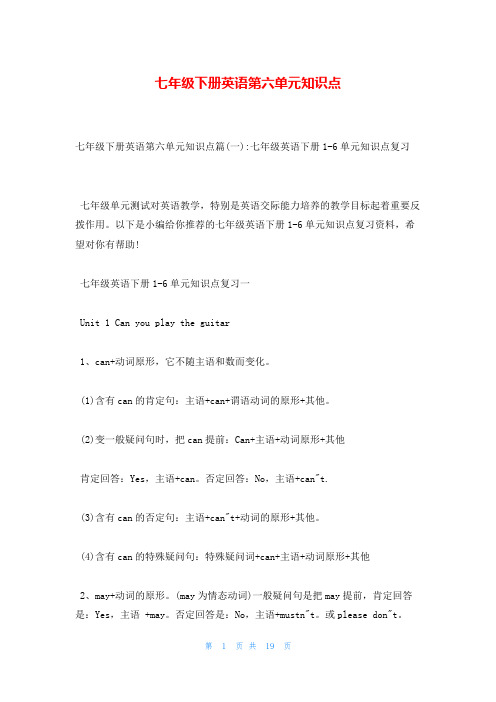
七年级下册英语第六单元知识点七年级下册英语第六单元知识点篇(一):七年级英语下册1-6单元知识点复习七年级单元测试对英语教学,特别是英语交际能力培养的教学目标起着重要反拨作用。
以下是小编给你推荐的七年级英语下册1-6单元知识点复习资料,希望对你有帮助!七年级英语下册1-6单元知识点复习一Unit 1 Can you play the guitar1、can+动词原形,它不随主语和数而变化。
(1)含有can的肯定句:主语+can+谓语动词的原形+其他。
(2)变一般疑问句时,把can提前:Can+主语+动词原形+其他肯定回答:Yes,主语+can。
否定回答:No,主语+can"t.(3)含有can的否定句:主语+can"t+动词的原形+其他。
(4)含有can的特殊疑问句:特殊疑问词+can+主语+动词原形+其他2、may+动词的原形。
(may为情态动词)一般疑问句是把may提前,肯定回答是:Yes,主语 +may。
否定回答是:No,主语+mustn"t。
或please don"t。
join+某个组织,俱乐部,party,参军,党派等“加入”Join sb. “参加到某人中” join in (doing)sth “加入做......,参加某个活动” Join in=take part in +活动,比赛3、说某种语言:speak+语言4、play+球、棋、牌;play+the+乐器。
5、擅长于(做)什么:be good at +名词/动ing6、帮助某人做某事:help sb. (to ) do sth. help sb. with sth.7、我能知道你名字吗May I know your name8、想要做什么:want to do sth 例如:I want to learn about art.9、What club do you want to joinI want to join the chess club and the basketball club.10、What club does Tom want to join He wants to join the swimming club .11、He can’t play the violin or the piano. Can you help kids with swimming12、Why do you want to join the English club Because I want to learn English well.Unit 2 What time do you go to school1、what time和when引导的特殊疑问句。
Units 1-6重点词汇期中总复习2022-2023学年人教版英语七年级下册(含答案)
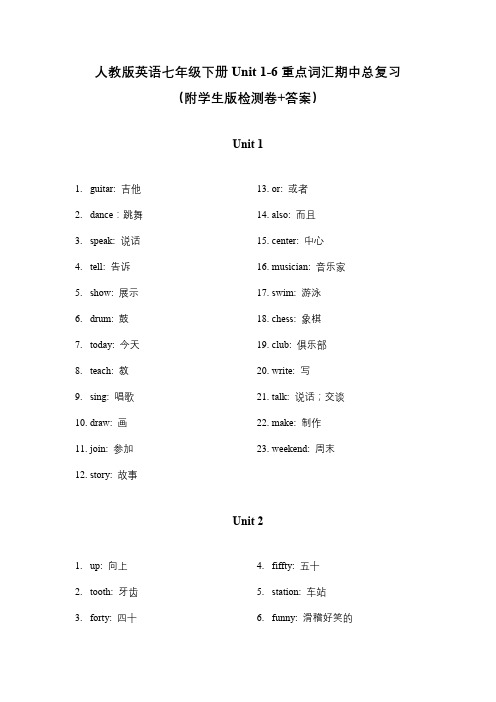
人教版英语七年级下册Unit 1-6重点词汇期中总复习(附学生版检测卷+答案)Unit 11.guitar: 吉他2.dance:跳舞3.speak: 说话4.tell: 告诉5.show: 展示6.drum: 鼓7.today: 今天8.teach: 教9.sing: 唱歌10.draw: 画11.join: 参加12.story: 故事13.or: 或者14.also: 而且15.center: 中心16.musician: 音乐家17.swim: 游泳18.chess: 象棋19.club: 俱乐部20.write: 写21.talk: 说话;交谈22.make: 制作23.weekend: 周末Unit 21.up: 向上2.tooth: 牙齿3.forty: 四十4.fiffty: 五十5.station: 车站6.funny: 滑稽好笑的7.group: 组;群8.quarter: 一刻钟;四分之一9.run: 跑10.quickly: 迅速地11.sometimes: 有时候12.dress: 连衣裙13.shower: 淋雨14.never: 从不15.job: 工作16.o’clock: 点钟17.exercise: 锻炼18.half: 一半19.clean: 打扫20.either: 也21.taste: 品尝22.brush: 刷子ually: 一般地24.early: 早的25.work: 工作26.night: 夜晚27.best: 最好的28.past: 过去的29.homework: 家庭作业30.walk: 行走31.lot: 许多32.life: 生命Unit 31.trian: 火车2.ride: 骑3.seventy: 七十4.hundred: 一百5.kilometer: 千米6.by: 乘;坐7.live: 居住8.between: 在……之间9.like: 像10.bus: 公共汽车11.bike: 自行车12.eighty: 八十13.minute: 分钟14.new: 新的15.drive: 开车16.stop: 停止17.year: 年18.leave: 离开19.subway: 地铁20.sixty: 六十21.ninety: 九十22.far: 遥远的23.every: 每一个24.car: 小汽车25.river: 河流26.afriad: 恐怕的;害怕的Unit 41.rule: 规则2.listen: 听3.outside: 在外面4.bring: 带来5.practice: 练习6.kitchen: 厨房7.relax: 放松8.feel: 感觉9.follow: 跟随;遵循10.arrive: 到达11.fight: 打架12.wear: 穿13.quiet: 安静的14.before: 在……之前15.more: 更多的16.read: 读17.strict: 严厉的18.luck: 幸运19.learn: 学习20.hall: 大厅21.sory: 抱歉的22.important: 重要的23.out: 外出24.dirty: 脏的25.noisy: 吵闹的26.terrible: 可怕的27.remember: 记得28.keep: 保持Unit 51.panda: 大熊猫2.elephant: 大象3.animal: 动物4.smart: 聪明的5.Australia: 澳大利亚6.friendly: 友好的7.flag: 旗帜8.danger: 危险9.kill: 杀死10.zoo: 动物园11.lion: 狮子12.cute: 可爱的13.beautiful: 美丽的14.south: 南方的15.shy: 害羞的16.forget: 忘记17.cut: 砍;切18.over: 在……上方19.tiger: 老虎20.giraffe: 长颈鹿zy: 懒惰的22.kind: 种类23.Africa: 非洲24.save: 挽救;节约25.place: 地方26.down: 向下Unit 61.newspaper: 报纸2.movie: 电影3.tea: 茶4.shop: 商店5.race: 比赛6.American: 美国人7.other: 其他的8.miss: 想念9.still: 仍然e: 使用11.just: 恰好;只是12.tomorrow: 明天13.supermark: 超市14.study: 学习15.young: 年轻的16.wish: 希望17.wash: 洗18.drink: 喝19.pool: 池塘20.man: 男人21.state: 州22.any: 任何的23.child: 儿童24.delicious: 美味的25.place: 地方人教版七年级下册Unit 1-6 重点词汇检测【期中总复习】(附答案)Unit 11.吉他:2.跳舞:3.说话:4.告诉:5.展示:6.鼓:7.今天:8.教:9.唱歌:10.画:11.参加:12.周末:13.制作:14.谈话:15.写:16.俱乐部:17.象棋:18.游泳:19.音乐家:20.中心:21.而且:22.或者:23.故事:Unit 21.向上:2.牙齿:3.四十:4.五十:5.车站:6.滑稽好笑的:7.组;群:8.一刻钟:9.跑:10.迅速地:11.品尝:12.刷子:13.一般地:14.早的:15.工作:16.夜晚:17.有时候:18.连衣裙:19.淋浴:20.从不:21.工作:22.点钟:23.锻炼:24.一半:25.打扫:26.也:27.最好的:28.过去的:29.家庭作业:30.行走:31.许多:32.生命:Unit 31.火车:2.骑:3.七十:4.一百:5.千米:6.乘;坐:7.居住:8.在……之间:9.像:10.公共汽车:11.八十:12.分钟:13.新的:14.开车:15.停止:16.车:17.离开:18.地铁:19.六十:20.九十:21.遥远的:22.每一个:23.小汽车:24.河流:25.恐怕的;害怕的:Unit 41.规则:2.听:3.在外面:4.带来:5.跟随:6.到达:7.打架:8.穿:9.安静的:10.在……之前:11.读:12.严厉的:13.幸运:14.学习:15.大厅:16.抱歉的:17.重要的:18.外出:19.脏的:20.吵闹的:21.可怕的:22.记得:23.保持:Unit 51.大熊猫:2.大象:3.动物:4.聪明的:5.澳大利亚:6.友好的:7.旗帜:8.危险:9.杀死:10.动物园:11.狮子:12.可爱的:13.美丽的:14.南方的:15.害羞的:16.忘记:17.砍:18.在……上方:19.老虎:20.长颈鹿:21.懒惰的:22.种类:23.非洲:24.挽救:25.地方:26.向下:Unit 61.报纸:2.电影:3.茶:4.商店:5.比赛:6.美国人:7.其他的:8.想念:9.仍然:10.使用:11.只是;恰好:12.明天:13.超市:14.学习:15.年轻的:16.希望:17.洗:18.喝:19.池塘:20.男人:21.州:22.任何的:23.儿童:24.美味的:参考答案Unit 11.guitar2.dance3.speak4.tell5.show6.drum7.today8.teach9.sing10.draw11.join12.weekend13.make14.talk15.write16.club17.chess18.swim19.musician20.center21.also22.or23.story Unit 21.up2.tooth3.forty4.fifty5.station6.funny7.group8.quarter9.run10.quickly 11.taste12.brushually14.early15.work16.night17.sometimes18.dress19.shower20.never21.o’clock22.exercise23.half24.clean25.also26.better27.past28.homework29.walk30.lot31.lifeUnit 31.train2.ride3.seventy4.kilometer5.by6.between7.like8.bus9.minute10.new11.drive12.stop13.car14.leave15.subway16.sixty17.ninety18.far19.every20.car21.river22.afraid Unit 41.rule2.listen3.outside4.fight5.wear6.quiet7.before8.read9.strict10.luck11.learn12.hall13.sorry14.important15.out16.dirty17.noisy18.terrible19.remember20.keep Unit 51.panda2.elephant3.animal4.smart5.Australia6.friendly7.flag8.danger9.kill10.zoo11.lion12.cute13.beautiful14.south15.shy16.forget17.cut18.over19.tiger20.giraffezy22.kind23.Africa24.save25.place26.down Unit 61.newspaper2.movie3.tea4.shop5.American6.other7.miss8.stille10.just11.tomorrow12.supermarket13.learn14.young15.wish16.wash17.drink18.pool19.man20.child21.delicious。
七年级下英语1-6单元复习笔记
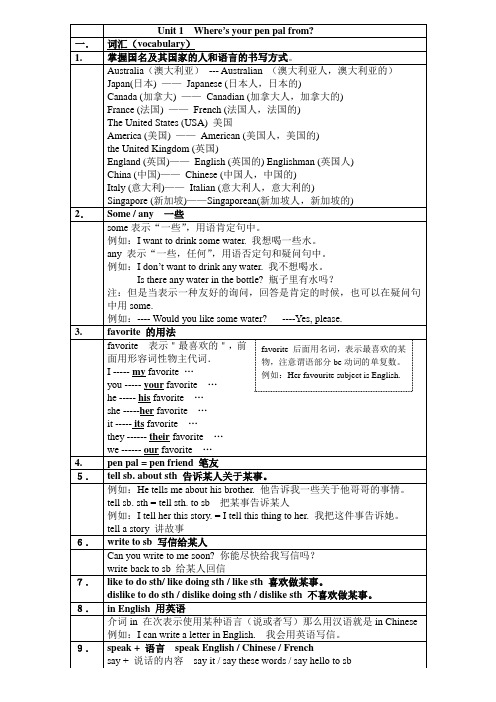
语法(grammar)
一般现在时,含有be动词的句子和实义动词的句子。
be动词的句子
She is a student.(肯定句)
She is not a student.(否定句)
Is she a student?(一般疑问句)
Yes,she is. No, she isn’t.(一般疑问句的简略回答)
7.
let + do(动词原形)让……
Let’s do our homework.让我们做作业吧。
Let’s swim in the pool.让我们到泳池游泳吧。
8.
the way to…通向哪里的路(注意介词to)
例如:Can you please tell me the way to the post office?
例如:I can write a letter in English.我会用英语写信。
9.
speak +语言speak English / Chinese / French
say +说话的内容say it / say these words / say hello to sb
tell sth to sb / tell sb sth / tell sb about sth
any表示“一些,任何”,用语否定句和疑问句中。
例如:I don’t want to drink any water.我不想喝水。
Is there any water in the bottle?瓶子里有水吗?
注:但是当表示一种友好的询问,回答是肯定的时候,也可以在疑问句中用some.
例如:---- Would you like some water? ----Yes, please.
一轮复习 七年级下Units 1-6
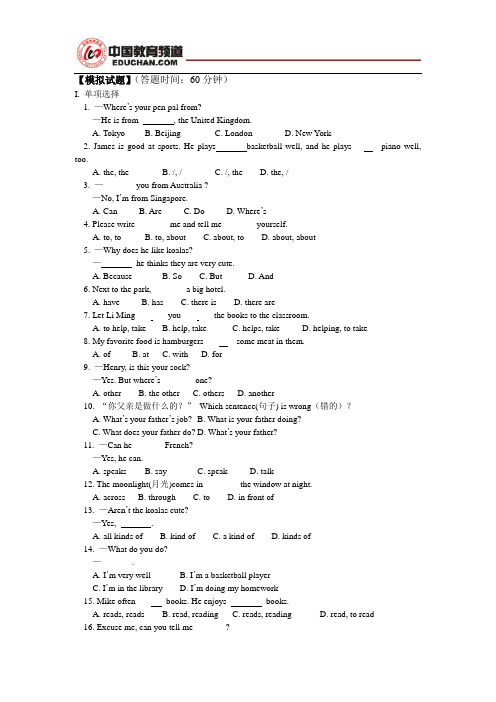
【模拟试题】(答题时间:60分钟)I. 单项选择1. —Where’s your pen pal from?—He is from , the United Kingdom.A. TokyoB. BeijingC. LondonD. New York2. James is good at sports. He plays basketball well, and he plays __ __piano well, too.A. the, theB. /, /C. /, theD. the, /3. —_______ you from Australia ?—No, I’m from Singapore.A. CanB. AreC. DoD. Where’s4. Please write _______ me and tell me _______ yourself.A. to, toB. to, aboutC. about, toD. about, about5. —Why does he like koalas?—he thinks they are very cute.A. BecauseB. SoC. ButD. And6. Next to the park, _______ a big hotel.A. haveB. hasC. there isD. there are7. Let Li Ming ___ ___ you ___ ___ the books to the classroom.A. to help, takeB. help, takeC. helps, takeD. helping, to take8. My favorite food is hamburgers ___ __some meat in them.A. ofB. atC. withD. for9. —Henry, is this your sock?—Yes. But where’s _______ one?A. otherB. the otherC. othersD. another10. “你父亲是做什么的?”Which sentence(句子) is wrong(错的)?A. What’s your father’s job?B. What is your father doing?C. What does your father do?D. What’s your father?11. —Can he _______French?—Yes, he can.A. speaksB. sayC. speakD. talk12. The moonlight(月光)comes in ________the window at night.A. acrossB. throughC. toD. in front of13. —Aren’t the koalas cute?—Yes, .A. all kinds ofB. kind ofC. a kind ofD. kinds of14. —What do you do?—_______.A. I’m very wellB. I’m a basketball playerC. I’m in the libraryD. I’m doing my homework15. Mike often ____ __books. He enjoys books.A. reads, readsB. read, readingC. reads, readingD. read, to read16. Excuse me, can you tell me _______?A. how can I get to the children’s palaceB. how to arrive the children’s palaceC. how can get to the children’s palaceD. how to get to the children’s palace17. What _do you want to see in the zoo?A. other animalB. the other animalC. another animalsD. other animals18. Here _ some news about the job for you.A. areB. isC. be C. am19. I work _ __ him __ _ a waiter.A. as, toB. for, toC. for, asD. as, in20. The busy street is _______ to small children.A. difficultB. dangerousC. interestingD. funII. 完形填空It’s a fine Sunday morning. Ann and her mother are on a big bus. There are 21 people on it. Some 22 from America, and some 23 England and Canada. They are all 24 friends. They’re going to the Great Wall(长城). 25 two Chinese on the bus. 26 is a woman. She is 27 the bus. The other is a young man. He 28 good English. He is now talking 29 the Great Wall. The other people are all listening to him. They like the Great Wall. They want to see it 30 .21. A. much B. any C. a little D. many22. A. is B. are C. has D. have23. A. with B. of C. from D. about24. A. her B. his C. our D. their25. A. They B. Their C. There D. There’re26. A. That B. This C. The one D. One27. A. riding B. taking C. driving D. carrying28. A. speaks B. says C. talks D. listens29. A. with B. on C. about D. at30. A. a lot B. lot of C. very D. muchIII. 阅读理解根据Sophia的来信,选择正确答案。
外研版七年级下册Module1-Module6词汇,短语,语法,作文复习总汇
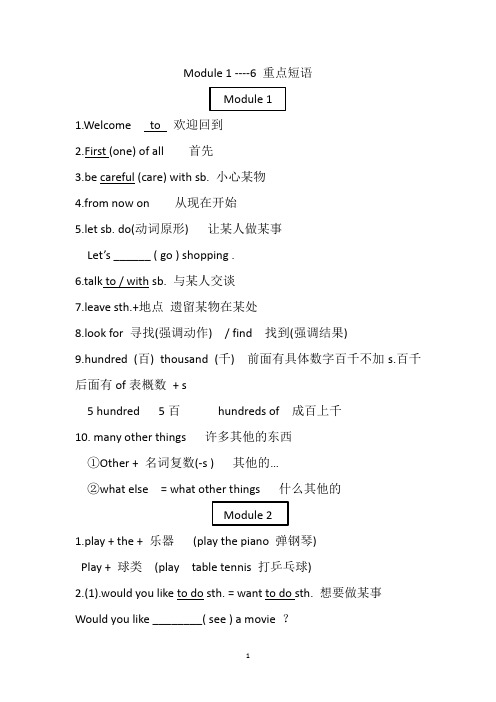
Module 1 ----6 重点短语Module 11.Welcome to 欢迎回到2.First (one) of all 首先3.be careful (care) with sb. 小心某物4.from now on 从现在开始5.let sb. do(动词原形) 让某人做某事Let’s ______ ( go ) shopping .6.talk to / with sb. 与某人交谈7.leave sth.+地点遗留某物在某处8.look for 寻找(强调动作) / find 找到(强调结果)9.hundred (百) thousand (千) 前面有具体数字百千不加s.百千后面有of表概数+ s5 hundred 5百hundreds of 成百上千10. many other things 许多其他的东西①Other + 名词复数(-s ) 其他的…②what else = what other things 什么其他的Module 21.play + the + 乐器(play the piano 弹钢琴)Play + 球类(play table tennis 打乒乓球)2.(1).would you like to do sth. = want to do sth. 想要做某事Would you like ________( see ) a movie ?(2).like doing sth. 喜欢做某事I like ________( see ) a movie .(3) enjoy doing sth. 喜欢做某事I enjoy ________( see ) a movie .(4). enjoy oneself 玩得开心enjoy myself 我玩得开心enjoy yourself 你玩得开心enjoy (herself/himself) 他/她玩得开心enjoy (yourselves/ourselves/themselves)你们/我们/他们玩得开心3.What about / how about + v.ing …怎么样?What about ________(see )a movie ?4.worry about (sb./sth. )担心某人/某物= be worried about (sb./ sth.)5.teach sb. sth. 叫某人某事Miss Suo teach _______( us / our ) English .6. get on well with sb. 与某人相处得好7.be good at doing sth. 擅长做某事= do well in doing sth. …做得好She is good at ______ (swim) .=______________________8. be ready to do sth. 准备做某事I am ready ______ ( go ) to school .9.promise to do sth. 许诺做某事I promise _______ (help) you .10.①help sb. ( to ) do sth. 帮助某人做某事We help our mother ______ (clean ) the rooms .②Help sb. with sth. 在某方面帮助某人11.make + v.原/ adj.形容词使…e with sb. 与某人一起来13.stay with sb. 与某人待在一起Module 31.be going to do sth. 打算做某事We are going to______ (have ) a picnic .2.look forward to doing sth. 期盼做某事I am look forward to _______ (see ) a movie .3. (1). spend (花费) 用法①sb.(某人) spend money/time on sth. 某人在某物上花费时间/钱②sb.(某人) spend money/time (in) doing sth.某人在某做某事上花费时间/钱(2) take (花费)①It take time to do sth. 做某事花费时间(3). Cost (花费/价值)Sth. cost sb. money 某物花费某人钱/某物值…钱(4). Pay for (支付)Sb. pay money for sth. 某人支付…钱为某物!练习:用spend/take / cost/pay 填空(1.) It __________ me ten hours to get Nanning .(2.) I _______ me ten hours getting Nanning .(3.) The pen ______ me 10 yuan .(4.) We need _______ 10 yuan for the pen .4.Watch sb. do sth. 看到某人做了某事(看了全过程)5.Watch sb. doing sth. 看到某人正在做某事(看到正在发生片段)5.feel lonely 觉得孤独/ live alone 独自生活6.make friends 交朋友7.It’s time to do sth. 到做某事的时间了= It’s time for doing sth.It’s time _______( go ) home .=_______________________Module 41.A be different from B A与B 不同2. A be the same as B A与B 相同3.There will be = there is / are going to be 将会有4.be able to = can 能5.not …anymore 不再6.not only A but also B 不但A 而且B ( 就近原则) Not only you but also I ______( be ) good at English .7.①A as well as B A还有B ( 用A做主语)You as well as I ______( be ) good at English .②as well =too 也e true 实现9.have sth. to do .有某事要做We have a lot of books ______ ( buy ) .10.in+一段时间表将来( in 20 years’time 再20年后)I _______ ( see ) a movie in two days .11.It’s + adj.(形容词) + to do sth. 做…是…的。
人教版七年级下册1——6复习提纲
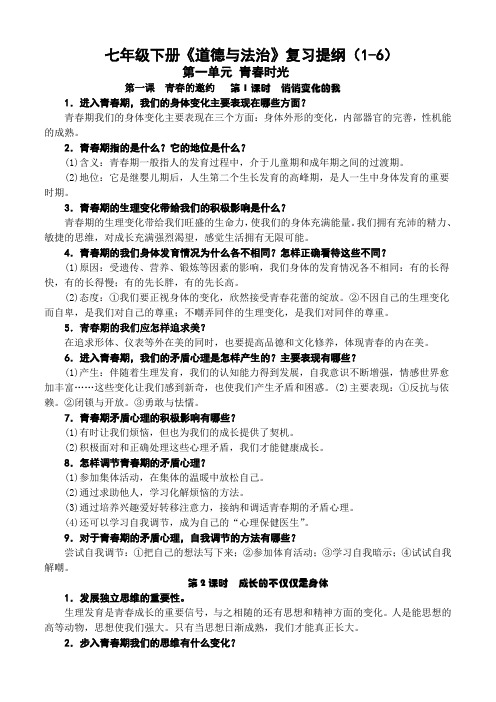
七年级下册《道德与法治》复习提纲(1-6)第一单元青春时光第一课青春的邀约第1课时悄悄变化的我1.进入青春期,我们的身体变化主要表现在哪些方面?青春期我们的身体变化主要表现在三个方面:身体外形的变化,内部器官的完善,性机能的成熟。
2.青春期指的是什么?它的地位是什么?(1)含义:青春期一般指人的发育过程中,介于儿童期和成年期之间的过渡期。
(2)地位:它是继婴儿期后,人生第二个生长发育的高峰期,是人一生中身体发育的重要时期。
3.青春期的生理变化带给我们的积极影响是什么?青春期的生理变化带给我们旺盛的生命力,使我们的身体充满能量。
我们拥有充沛的精力、敏捷的思维,对成长充满强烈渴望,感觉生活拥有无限可能。
4.青春期的我们身体发育情况为什么各不相同?怎样正确看待这些不同?(1)原因:受遗传、营养、锻炼等因素的影响,我们身体的发育情况各不相同:有的长得快,有的长得慢;有的先长胖,有的先长高。
(2)态度:①我们要正视身体的变化,欣然接受青春花蕾的绽放。
②不因自己的生理变化而自卑,是我们对自己的尊重;不嘲弄同伴的生理变化,是我们对同伴的尊重。
5.青春期的我们应怎样追求美?在追求形体、仪表等外在美的同时,也要提高品德和文化修养,体现青春的内在美。
6.进入青春期,我们的矛盾心理是怎样产生的?主要表现有哪些?(1)产生:伴随着生理发育,我们的认知能力得到发展,自我意识不断增强,情感世界愈加丰富……这些变化让我们感到新奇,也使我们产生矛盾和困惑。
(2)主要表现:①反抗与依赖。
②闭锁与开放。
③勇敢与怯懦。
7.青春期矛盾心理的积极影响有哪些?(1)有时让我们烦恼,但也为我们的成长提供了契机。
(2)积极面对和正确处理这些心理矛盾,我们才能健康成长。
8.怎样调节青春期的矛盾心理?(1)参加集体活动,在集体的温暖中放松自己。
(2)通过求助他人,学习化解烦恼的方法。
(3)通过培养兴趣爱好转移注意力,接纳和调适青春期的矛盾心理。
(4)还可以学习自我调节,成为自己的“心理保健医生”。
人教版最新七年级英语下1--6单元期中综合复习题
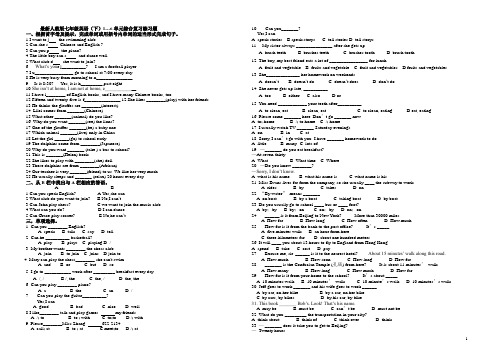
最新人教版七年级英语(下)1---6单元综合复习练习题一、根据首字母及提示,完成单词或用括号内单词的适当形式完成句子。
1.I want to j the swimming club.2.Can she s Chinese and English ?3.Can you p the piano?4.The little boy can s and dance well.5.What club d she want to join?6.--- What’s you r j__________? --- I am a football player.7.I u________________ go to school at 7:00 every day.8.He is very busy from morning to n_______________.9.---Is it 8:30? --- Yes, it is h_________ past eight.10.She isn’t at home, I am not at home, e_____________.11.I have l________ of English books, and I have many Chinese books, too.12.Fifteen and twenty-five is f_______________.12.She likes ________(play) with her friends.13.He thinks the giraffes are ________(interest) .14. Lilei comes from _______(Chinese).15.What other _______(animal) do you like?16. Why do you want _______(see) the lions?17.One of the giraffes _______(be) a baby one.17.Which animal _______(live) only in China.18.Let the girl ______(go) to school early.19.The dolphins come from ________(Japanese).20.Why do you want _______ (take ) a bus to school?21.This is _______(Helen) book.22.She likes to play with ________(she) doll.23.These dolphins are from ________(African).24.Our teacher is very _______(friend) to us. We like her very much.25.He usually sleeps and _______ (relax) 20 hours every day.二、从B栏中找出与A栏相应的答语。
(人教版)中考英语总复习夯实基础:(七下)Units 1~6(96页)
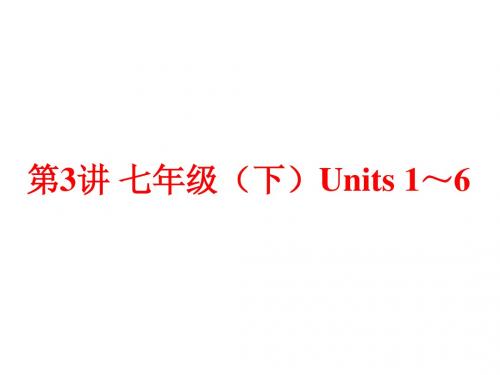
It's been 5 years since Mr. Liu joined the Party. 刘先生入党已经 5 年了。 How many countries took part in the last Olympic Games?有多少个国家参加了上届奥运会? Why didn't you attend the meeting yesterday? 你为什么没有参加昨天的会议?
意为“弹奏; 演奏; 吹奏”。 当 play 和乐器名词连用时,
2.I want to join the art club. 我想加入艺术俱乐部。(Unit 1)
【妙辨异同】 join, take part in 与 attend 加入党派、团体、组织、俱乐部等;join join take part in attend sb.“ 与 某 人 一 起 ” ; join in (doing) sth.“参加(活动)” 参加活动并在其中起作用 “出席(会议),到场”;只强调人到场, 不强调其作用
①用“by + 交通工具名词”表示交通方式, 交通 工具前不用任何修饰词。 by bike 骑自行车 共汽车 by water 由水路 by sea 从海路 by land 从陆路 by air 乘飞机 by bus 乘公
②用“by + 交通路线的位置”来表示交通方式。
③用“in/on + 冠词/形容词性物主代词/指示代 词 + 交通工具名词”表示交通方式。 其中,in 多用 在 car 等交通工具之前,而 on 多用在 bike/horse/bus/train/ship 等交通工具之前, 它们的用法 与“by+交通工具名词”的用法相同。 She often goes to school on a/her bike.= She often goes to school by bike. 她经常骑自行车上学。
英语七下复习单词卷Units 1-6

不许讲话 遵守校规 no talking follow/keep/obey the school rules run in the hallways 在过道上追逐打闹 fight with sb. 和某人打架 go out on school nights 在上学日的晚上外出 on school days 在上学期间 hang out with sb. 和某人在外闲逛 too many 太多(+可数复数) too much 太多(+不可数) 如此多(+可数名词复数)so many 如此多(+不可数名词) so much
get dressed eat/have breakfast brush one’s teeth take a shower be good for daily routine/life a/ the radio show half an hour healthy/unhealthy habits at the radio station at night be late for a/ the shower schedule
二、重点短语
安静 洗衣服 洗碗 准时 到达(两个)…… 到家/到这儿/到那儿 听一张CD/广播 穿一套制服 keep/be quiet wash (one’s) clothes do the dishes on time arrive at/in… ; get to… arrive home/here/there listen to a CD/ the radio wear a uniform
Unit 3 一、重点单词 kilometer 千米 minute 分钟 village 村庄 villager 村民 bridge 桥 hundred 百 ninety 九十
七年级下册语文 1-6单元必背知识清单
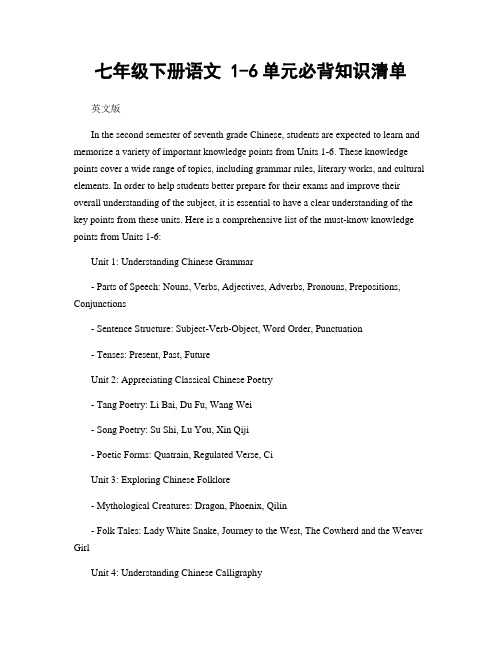
七年级下册语文 1-6单元必背知识清单英文版In the second semester of seventh grade Chinese, students are expected to learn and memorize a variety of important knowledge points from Units 1-6. These knowledge points cover a wide range of topics, including grammar rules, literary works, and cultural elements. In order to help students better prepare for their exams and improve their overall understanding of the subject, it is essential to have a clear understanding of the key points from these units. Here is a comprehensive list of the must-know knowledge points from Units 1-6:Unit 1: Understanding Chinese Grammar- Parts of Speech: Nouns, Verbs, Adjectives, Adverbs, Pronouns, Prepositions, Conjunctions- Sentence Structure: Subject-Verb-Object, Word Order, Punctuation- Tenses: Present, Past, FutureUnit 2: Appreciating Classical Chinese Poetry- Tang Poetry: Li Bai, Du Fu, Wang Wei- Song Poetry: Su Shi, Lu You, Xin Qiji- Poetic Forms: Quatrain, Regulated Verse, CiUnit 3: Exploring Chinese Folklore- Mythological Creatures: Dragon, Phoenix, Qilin- Folk Tales: Lady White Snake, Journey to the West, The Cowherd and the Weaver GirlUnit 4: Understanding Chinese Calligraphy- Brush Strokes: Horizontal, Vertical, Diagonal, Hook- Styles: Regular Script, Running Script, Cursive Script- Famous Calligraphers: Wang Xizhi, Yan Zhenqing, Su DongpoUnit 5: Learning about Chinese Festivals- Spring Festival: Chinese New Year, Lantern Festival- Mid-Autumn Festival: Mooncakes, Chang'e- Dragon Boat Festival: Zongzi, Dragon Boat RacesUnit 6: Appreciating Chinese Literature- Four Great Classical Novels: Romance of the Three Kingdoms, Water Margin, Journey to the West, Dream of the Red Chamber- Modern Literature: Lu Xun, Ba Jin, Lao SheBy memorizing these key knowledge points, students will be better equipped to excel in their Chinese studies and gain a deeper appreciation for the language and culture. Good luck!完整中文翻译在七年级下学期的语文课程中,学生们需要学习并背诵来自1-6单元的各种重要知识点。
人教版新目标英语七年级下学期期中考试分类复习训练题(Units 1-6词汇篇,含答案,)
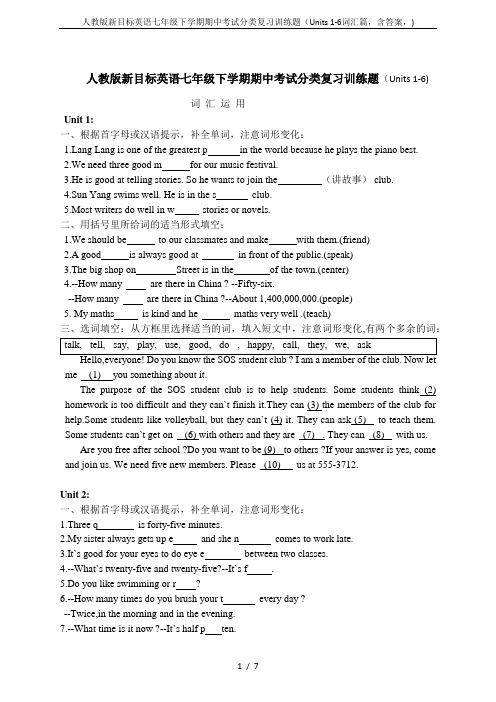
人教版新目标英语七年级下学期期中考试分类复习训练题(Units 1-6)词汇运用Unit 1:一、根据首字母或汉语提示,补全单词,注意词形变化:ng Lang is one of the greatest p in the world because he plays the piano best.2.We need three good m for our music festival.3.He is good at telling stories. So he wants to join the (讲故事) club.4.Sun Yang swims well. He is in the s club.5.Most writers do well in w stories or novels.二、用括号里所给词的适当形式填空:1.We should be to our classmates and make with them.(friend)2.A good is always good at in front of the public.(speak)3.The big shop on Street is in the of the town.(center)4.--How many are there in China ? --Fifty-six.--How many are there in China ?--About 1,400,000,000.(people)5. My maths is kind and he maths very well .(teach)三、选词填空:从方框里选择适当的词,填入短文中,注意词形变化,有两个多余的词:me (1) you something about it.The purpose of the SOS student club is to help students. Some students think (2) homework is too difficult and they can`t finish it.They can (3) the members of the club for help.Some students like volleyball, but they can`t (4) it. They can ask (5) to teach them. Some students can`t get on (6) with others and they are (7) . They can (8) with us.Are you free after school ?Do you want to be (9) to others ?If your answer is yes, come and join us. We need five new members. Please (10) us at 555-3712.Unit 2:一、根据首字母或汉语提示,补全单词,注意词形变化:1.Three q is forty-five minutes.2.My sister always gets up e and she n comes to work late.3.It`s good for your eyes to do eye e between two classes.4.--What`s twenty-five and twenty-five?--It`s f .5.Do you like swimming or r ?6.--How many times do you brush your t every day ?--Twice,in the morning and in the evening.7.--What time is it now ?--It`s half p ten.8.The cake t very delicious.So I would like another one.9.The boy (通常)takes a walk after dinner with his dog.10.Sometimes they don`t do their homework very q , (也).二、用括号里所给词的适当形式填空:1.Anna often gets up late and gets very slowly in the morning.(dress)2.Doctors always do what they can do to save people`s .(life)3.You can use two to your shoes.(brush)4.Mr.Green very hard. His come out sometimes in the newapaper.(work)5.What a story! It makes us happy.(fun)三、选词填空:从方框里选择适当的词,填入短文中,注意词形变化,有两个多余的词:( 1 ).They never (2) to school. (3) some of their friends walk to school every day. Sam and Ann (4) home at fifteen to five in the afternoon. They do their homework before dinner,sometimes they (5) watch TV or play computer games after dinner. They sometimes go to bed late.Sam and Ann often have three (6) a day--breakfast, lunch and dinner. They have breakfast at home. (7) Monday to Friday they have lunch at school.They eat dinner at home. Sam and Ann`s father has a good (8) . He (9) in a radio station. He comes home from work at five and (10) dinner at six .Unit 3:一、根据首字母或汉语提示,补全单词,注意词形变化:1.Hold on to China`s D . It is sure to come t .2.Many old (村民) never leave their v to see the world outside.3.Some people on the farm can r the horse. It is exciting.4.How old is your grandfather ? (八十)5.There is a big river b Wuchang and Hankou.You can see a few b over the river and lots of b in the river.二、用括号里所给词的适当形式填空:1.My father is a taxi .He does best in .(drive)2.There are of shared-bikes in the big city, but only about three ones are in the small town.(hundred)3.The bank is from the street.Do be careful to the busy street because there are many buses or cars at the . (cross)4.Peter looks his mother but his brother, he is short and fat.(like)5.This is a story. It is sad. The is that lots of people died of car accidents.(true)三、选词填空:从方框里选择适当的词,填入短文中,注意词形变化,有两个多余的词:Chris is 12 years old. He (1) (2)home, so he often goes to school (3) foot.He usually gets up at about 7:00 in the morning. It is not (4) . So he has a quick breakfast. He (5) for school at about 7:50.It (6) him about 10 minutes to come to school.He gets to school at about 8:00. Sometimes Chris (7)his bike to school. School starts at 8:10. His favorite subject is maths. He (8) numbers are interesting.Chris has a dream. He (9) to go to a big city like London some day. So he can take the subway."I want to take the subway. It must be lots of fun."Can his dream (10) true ?"Sure, it can," says Chris.Unit 4:一、根据首字母或汉语提示,补全单词,注意词形变化:1.Could you please b your ID card with you when you come here next time?2.A at school on time is very important to a student.3.Don`t eat in the library, but you can eat (在外面).4.Anna is a q girl. She likes sitting in the classroom q and says nothing.5.Remember to (练习) r English texts every morning.6.Do you often help your mother do the d after each meal ?7.K the hair short is a rule for boys at school.8.We must f the school and family rules because they are good for us.9.Never f (打架) in the hallways. It is dangerous.10.Be sure to (穿)your school uniforms when you come to school.二、用括号里所给词的适当形式填空:1.I am sorry to hear the news.(terrible)2.Stop making much .It`s too here. (noise)3.He is helpful and he always thinks of others than himself.(much)4.We are so that we can learn what we want.But ,some students in the poor villages in Guizhou can`t go to school. (luck)5.It is to ourselves on the beach.(relax)三、选词填空:从方框里选择适当的词,填入短文中,注意词形变化,有两个多余的词:Molly has too many rules. She has to get up and make her bed at 6:00a.m. at home. After breakfast, she can`t (1) the dirty dishes in the kitchen. After that, she (2) to schoolbecause there are (3) rules at school. She can`t arrive late (4) class. She has to wear school uniforms (5) school days. She has to keep (6) in class. She can`t eat (7) listen to music in class. But she can eat in the dinning hall and listen to music after class. She can`t play basketball after school (8) she must do her homework. She can play( 9) on weekends. After dinner, she can`t watch TV. She has to go to bed at 10:00 in the evening. She thinks her parents are very (10) with her in everything.Do you think so ?Unit 5:一、根据首字母或汉语提示,补全单词,注意词形变化:1.There are lots of a in the zoo. We can see them on weekends.2.The young man doesn`t like working.He is very l .3.My uncle usually goes to bed early, so he s well every night and he never feelss (昏昏欲睡的) in the daytime.4.---Can you find Macau in the map of China ?--Yes. Look ! It`s in the s of China.5.--Where is Sydney ?--In A .And lots of koalas are in d because of the fire.二、用括号里所给词的适当形式填空:1.The girl looks very and she sings (beautiful).2.Lions are . Are you of them ?(scary)3.Mrs. Smith is and she often to bring the keys to the door.(forget)4.There are different of flowers on the trees and some smell of sweet.(kind)5.Alice is a girl. Because of her ,she is often afraid to talk with others.(shy)三、选词填空:从方框里选择适当的词,填入短文中,注意词形变化,有两个多余的词:(1) . So we often go to the zoo to see (2) on weekends.We often (3) a bus to go there. When we get there, it is often 10:00 in the morning, because my home is (4) of far from the zoo.Of all the animals, I like the tigers (5) . Why?Because they are smart and (6) from other animals. They aren`t shy. I know they like (7) meat. Sometimes I want to give some meat to them. But my mother doesn`t let me (8) it. She says we can`t do like this in the zoo. It`s (9) .Sometimes I think animals in the zoo may be sad in it. They may want to go back to their families. They may want to live freely in nature. But on the other hand, I think zoos are good ( 10) for animals. People give them food. They can`t be hungry. Do you think so ?Unit 6:一、根据首字母或汉语提示,补全单词,注意词形变化:1.Is there anything new in the morning (报纸)?2.There are about three m teachers in my class.And the others are women teachers.3.Do you know Walmart? It is one of the biggest s in the world.4.Many A in the US also stay at home to fight against COVID-19.5.Linda is a mother of three c . She loves them very much.二、用括号里所给词的适当形式填空:1.Look! There is a group of old people (sit) and (drink) tea by the lake.2.--Where is Bob ?--He`s in his (study).3.A dictionary is very . I often it to look up the new words in it.(use)4.Mr. Black in New York.He has a big room in his house.(live)5.My mother me to go to a better high school.(wish)三、选词填空:从方框里选择适当的词,填入短文中,注意词形变化,有两个多余的词:(1)Look! My grandfather is drinking tea as he is (2) CCTV news. It`s his favorite show. My grandmother is talking with my aunt from Beijing (3)the phone. She (4) my aunt very much. (5) happy my father is now! My father is reading a newspaper. He is reading a story in it. The story is (6) . Where is my mother ?Oh, she is in the kitchen. She is (7). She can cook delicious food for us. She is a good mother. Peter is my younger brother. He is 10 years old. He is (8) to music in his room. He likes music and he can play the piano and the guitar. He is good at (9) He wants to be a singer. What am I doing ?I am using the computer, but I am not playing games. I am (10) an e-mail.Answers:Unit 1:一、1.pianists 2. musicians 3.story telling 4.swimming 5. writing二、1.friendly, friends 2. speaker, speaking 3.Central , center 4. peoples, people5.teacher, teaches三、1.tell, 2, their 3.ask 4.play 6.well 7.unhappy 8.talk 9,useful 10.callUnit 2:一、1,quarters 2.early , never 3. exercises 4. fifty 5.running 6.teeth 7.past8.tastes ually 10. quickly, either二、1. dressed 2. lives 3. brushes, brush 4.works, works 5.funny三、1. too 2.walk 3.But 4.get 5.either 6.meals 7.From 8. job 9.works 10.eatsUnit 3:一、1.Dream, true 2. villagers, villages 3. ride 4. Eighty 5.between, bridges , boats二、1. driver, driving 2. hundreds, hundred 3.across, cross, crossing 4. like, unlike5. true, truly, truth三、1.lives 2.far 3.on 4.early 5. leaves 6.takes 7. rides 8. thinks9. hopes 10. comeUnit 4:一、1.bring 2. Arriving 3.outside 4.quiet, quietly 5. practice reading, 6.dishes7.Keeping 8.follow 9.fight 10. wear二、1.terribly, terrible 2. noise, noisy 3.more 4.lucky, unluckily 5.relaxing,relax三、1.leave, 2, runs 3. more 4. for 5, on 6. quiet 7. or 8. Because9.only 10. strictUnit 5:一、1. animals 2. lazy 3, sleeps , sleepy 4. south 5. Australia, danger二、1.beautiful, beautifully 2.scary, scared 3. forgetful, forgets4.kinds, kind5. shy, shyness三、1. too ,2.them 3. take 4. kind 5. best 6. different 7. eating8. do 9. dangerous `10. placesUnit 6:一、1. newspaper 2, men 3. supermarkets 4. Americans 5.children二、1.sitting, drinking 2.studying, study eful, use 4. lives, living5.wishes三、1.busy, 2,watching 3.on 4. misses 5. How 6. interesting7. cooking 8. listening 9.singing 10. writing。
七下1-6单元数学知识点总结
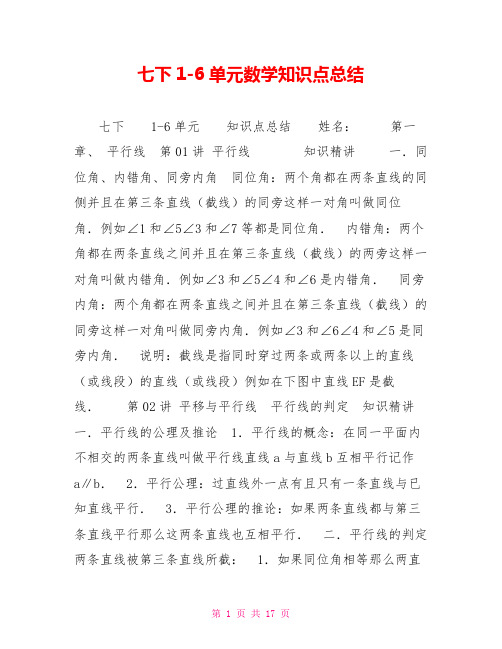
七下1-6单元数学知识点总结七下 1-6单元知识点总结姓名:第一章、平行线第01讲平行线知识精讲一.同位角、内错角、同旁内角同位角:两个角都在两条直线的同侧并且在第三条直线(截线)的同旁这样一对角叫做同位角.例如∠1和∠5∠3和∠7等都是同位角.内错角:两个角都在两条直线之间并且在第三条直线(截线)的两旁这样一对角叫做内错角.例如∠3和∠5∠4和∠6是内错角.同旁内角:两个角都在两条直线之间并且在第三条直线(截线)的同旁这样一对角叫做同旁内角.例如∠3和∠6∠4和∠5是同旁内角.说明:截线是指同时穿过两条或两条以上的直线(或线段)的直线(或线段)例如在下图中直线EF是截线.第02讲平移与平行线平行线的判定知识精讲一.平行线的公理及推论 1.平行线的概念:在同一平面内不相交的两条直线叫做平行线直线a与直线b互相平行记作a∥b. 2.平行公理:过直线外一点有且只有一条直线与已知直线平行. 3.平行公理的推论:如果两条直线都与第三条直线平行那么这两条直线也互相平行.二.平行线的判定两条直线被第三条直线所截: 1.如果同位角相等那么两直线平行; 2.如果内错角相等那么两直线平行; 3.如果同旁内角互补那么两直线平行.三点剖析一.平行公理及其推论平行线的判定.二.平行线的判定.三.1.不相交的两条直线互相平行一定要注意是在同一平面内否则结论就不一定成立;平行公理及其推论却不需要限定在同一平面内. 2.判定是由“数量关系”确定图形的“位置关系”因此能否找到两直线平行的条件关键是能否正确找到或识别出同位角、内错角、同旁内角.平行线的性质一.平行线的性质 1.两直线平行同位角相等; 2.两直线平行内错角相等; 3.两直线平行同旁内角互补.两条平行线之间的距离:在一条直线上任意找一点向另一条直线作垂线垂线段的长度就是两平行线之间的距离.三点剖析一.平行线的性质角度的计算与证明.二.常见的几种两条直线平行的结论1.两条平行线被第三条直线所截一组同位角的角平分线平行; 2.两条平行线被第三条直线所截一组内错角的角平分线平行; 3.两条平行线被第三条直线所截一组同旁内角的角平分线垂直.三.1.性质是由图形的“位置关系”决定“数量关系”; 2.两条平行线之间的距离其实可看成点到直线的距离.平移知识精讲一.平移的概念平移是指在平面内将一个图形上的所有点都按照某个方向做相同距离的直线移动这样的图形运动叫做图形的平移运动简称平移.二.平移的性质 1.经过平移之后的图形与原来的图形的对应线段平行(或在同一直线上)且相等图形的形状与大小都没有发生变化. 2.经过平移后对应点所连的线段平行(或在同一直线上)且相等.三.平移的作图 1.找出原图形的关键点(如顶点或者端点). 2.按要求分别描出各个关键点平移后的对应点. 3.按原图将各对应点顺次连接.三点剖析一.平移的性质平移作图.二.平移的性质.三.1.平移不改变图形的形状和大小和方向平移可以不是水平的; 2.有可能平行有可能在同一直线上.第二章、二元一次方程组手动选题手动排序二元一次方程组知识精讲一.二元一次方程的概念含有两个未知数并且两个未知数项的次数都是1的方程叫做二元一次方程.判定一个方程是二元一次方程必须同时满足三个条件: 1.方程两边的代数式都是整式——分母中不能含有字母; 2.有两个未知数----“二元”; 3.含有未知数的项的最高次数为1----“一次”.二.二元一次方程的解使二元一次方程两边的值相等的两个未知数的一组取值叫做二元一次方程的解.在写二元一次方程解的时候我们用大括号联立表示.如:方程的一组解为表明只有当和同时成立时才能满足方程.三.二元一次方程组的概念由几个一次方程组成并且一共含有两个未知数的方程组叫做二元一次方程组.四.二元一次方程组的解二元一次方程组中所有方程(一般为两个)的公共解叫做二元一次方程组的解.五.易错点: 1.和也是二元一次方程组. 2.二元一次方程组的解一定要写成联立的形式如方程组的解是. 3.二元一次方程组的解必须同时满足所有方程即将解代入方程组的每一个方程时等号两边的值都相等.二元一次方程组的解法知识精讲一.消元思想二元一次方程组中有两个未知数如果能“消去”一个未知数那么就能把二元一次方程组转化为我们熟悉的一元一次方程.这种将未知数的个数由多化少、逐一解决的思想叫做“消元”.使用“消元法”减少未知数的个数使多元方程组最终转化为一元方程再逐步解出未知数的值.二.代入消元法 1.代入消元法的概念将方程组中一个方程的某个未知数用含有另一个未知数的代数式表示出来代入另一个方程中消去一个未知数得到一个一元一次方程最后求得方程组的解这种解方程组的方法叫做代入消元法. 2.用代入消元法解二元一次方程组的一般步骤:(1)等量代换:从方程组中选一个系数比较简单的方程将这个方程中的一个未知数(例如y)用另一个未知数(如x)的代数式表示出来即将方程写成的形式;(2)代入消元:将代入另一个方程中消去y得到一个关于x的一元一次方程;(3)解这个一元一次方程求出x的值;(4)回代:把求得的x的值代入中求出y的值从而得出方程组的解;(5)把这个方程组的解写成的形式.三.加减消元法 1.加减消元法的概念当方程中两个方程的某一未知数的系数相等或互为相反数时把这两个方程的两边相加或相减来消去这个未知数从而将二元一次方程化为一元一次方程最后求得方程组的解这种解方程组的方法叫做加减消元法. 2.用加减消元法解二元一次方程组的一般步骤:(1)变换系数:利用等式的基本性质把一个方程或者两个方程的两边都乘以适当的数使两个方程里的某一个未知数的系数互为相反数或相等;(2)加减消元:把两个方程的两边分别相加或相减消去一个未知数得到一个一元一次方程;(3)解这个一元一次方程求得一个未知数的值;(4)回代:将求出的未知数的值代入原方程组的任何一个方程中求出另一个未知数的值;(5)把这个方程组的解写成的形式.三元一次方程组的解法知识精讲一.三元一次方程组的概念含有三个相同的未知数每个方程中含未知数的项的次数都是1并且一共由3个方程组成的方程组叫做三元一次方程组.二.三元一次方程组的解法解三元一次方程组的基本思想是消元.解题步骤:1.利用代入法或加减法消去一个未知数得出一个二元一次方程组; 2.解这个二元一次方程组求得两个未知数的值; 3.将这两个未知数的值代入原方程中较简单的一个方程求出第三个未知数的值从而求得三元一次方程组的解.三.易错点:为把三元一次方程组转化为二元一次方程组原方程组中的每个方程至少要用一次.二元一次方程的应用知识精讲一.二元一次方程的应用列方程(组)解应用题是中学数学联系实际的一个重要方面我们在七年级上学期已经学习过列一元一次方程解应用题其一般步骤可以简单归纳为“审、设、列、解、验、答”列方程组解应用题的步骤与列一元一次方程解应用题的步骤类似具体是: 1.审题:透彻理解题意弄清问题中的已知量和未知量找出问题给出和涉及的相等关系; 2.设元(未知数):根据题意可以直接设未知数也可以间接设未知数;3.列代数式和方程组:用含所设未知数的代数式表示其他未知数根据题中给出的等量关系列出方程组一般情况下未知数个数与方程个数是相同的; 4.解方程组; 5.检验:检验方程的根是否符合题意; 6.作答:检验后作出符合题目要求的答案.综上所述列方程(组)解应用题的实质是先把实际问题转化为数学问题(设元、列方程(组))再将数学问题解决从而解决实际问题.在这个过程中列方程起着承前启后的作用.因此列方程是解应用题的关键.第03讲含参的二元一次方程组手动选题手动排序含参的二元一次方程组知识精讲一.解含参数的二元一次方程组对于关于x、y的二元一次方程组:(、、、为已知数且与、与、与、与都不能同时为0).把含参的二元一次方程组化为含参一元一次方程再分类讨论结论如下: 1.当时方程组有唯一解为; 2.时原方程组有无数多组解; 3.当时原方程组无解.三点剖析一.考点:解含参的二元一次方程组含参二元一次方程组参数与解的关系含参二元一次方程组的同解问题.二.重难点: 1.方程的个数少于未知数的个数时方程组有无数多解; 2.含参二元一次方程组的整数解;3.方程组中的参数的取值范围.三.易错点:参数为给定明确取值范围时不要忘了分类讨论.第三章、整式的乘法第01讲整式的乘除手动选题手动排序幂的运算知识精讲一.幂的概念幂的概念:求n个相同因数的积的运算叫做乘方乘方的结果叫做幂在中a叫做底数n叫做指数. 二.幂的运算 1.同底数幂相乘:同底数的幂相乘底数不变指数相加.用式子表示为:(m,n都是正整数). 2.幂的乘方:幂的乘方底数不变指数相乘.用式子表示为:(m,n都是正整数). 3.积的乘方:积的乘方等于把积的每一个因式分别乘方再把所得的幂相乘.用式子表示为:(n是正整数).三点剖析一.考点:同底数幂的乘法幂的乘方积的乘方二.重难点:幂的综合运算三.易错点: 1.负数或者是分数的乘方要把底数加上括号防止计算错误; 2.运算法则一定要记牢计算时不要混淆;3.巧算时注意幂的运算的逆向运算.整式的乘法知识精讲一.单项式乘单项式法则:系数、同底数幂分别相乘作为积的因式只有一个单项式里含有的字母则连同它的指数作为积的一个因式. 说明:例如:两个单项式的系数分别为1和3乘积的系数是3两个单项式中关于字母a的幂分别是a和乘积中a的幂是同理乘积中b的幂是另外单项式ab中不含c 的幂而中含故乘积中含. 二.单项式乘多项式单项式分别与多项式中的每一项相乘然后把所得的积相加;公式为:其中m为单项式a+b+c为多项式. 三.多项式乘多项式将一个多项式中的每一个单项式分别与另一个多项式中的每一个单项式相乘然后把积相加;公式为:.四.易错点:1.单项式与单项式相乘的结果仍然是一个单项式;符号问题:“奇负偶正”; 2.单项式乘多项式以及多项式乘多项式最后的结果一定要合并同类项按运算法则计算避免漏项.整式的除法知识精讲一.同底数幂相除 1.同底数幂相除:同底数的幂相除底数不变指数相减.用式子表示为:(m,n都是正整数). 2.规定;(p是正整数).二.单项式除以单项式法则:系数、同底数的幂分别相除作为商的因式对于只在被除式中含有的字母则连同它的指数作为商的一个因式. 说明:例如:被除式为除式为系数分别为3和1故商中的系数为3a的幂分别为和故商中的幂为同理b的幂为另外被除式中含而除式中不含关于c的幂故商中c的幂为. 三.多项式除以单项式多项式中的每一项分别除以单项式然后把所得的商相加;公式为:其中m为单项式a+b+c为多项式. 三点剖析一.考点:同底数幂相除单项式相除多项式除以单项式二.重难点:同底数幂相除单项式相除多项式除以单项式三.易错点: 1.单项式与单项式相除的结果仍然是一个单项式;符号问题:“奇负偶正”;2.按运算法则计算避免漏项.第02讲乘法公式手动选题手动排序平方差公式知识精讲一.平方差公式平方差公式:. 平方差公式的特征:公式的左边是两个数的和乘以这两个数的差而公式的右边恰好是这两个数的平方差. 三点剖析一.考点:平方差公式二.重难点:平方差公式三.易错点: 1.a、b仅仅是一个符号它们可以表示数也可以表示式子(单项式、多项式等)只是它们的和与差的积一定等于它们的平方差. 例如:中把2x看成a3看成b;中把-m看成a2n看成b;中,把-2y看成a,3x看成b等等.完全平方公式知识精讲一.完全平方公式1.完全平方和公式:两数和的平方等于它们的平方和加上它们积的倍. 2.完全平方差公式:两数差的平方等于它们的平方和减去它们积的2倍. 3.完全平方公式的特征:左边是两个相同的二项式相乘右边是三项式是左边二中两项的平方和加上(这两项相加时)或减去(这两项相减时)这两项乘积的倍;公式中的字母可以表示具体的数(正数或负数)也可以表示单项式或多项式等代数式.二.完全平方公式的变形变形一:.变形二:.变形三:.变形四:.变形五:.三.三项完全平方公式四.完全立方公式第四章、因式分解知识精讲一.因式分解的概念把一个多项式化成几个整式的积的形式这样的式子变形叫做把这个多项式因式分解也叫做把这个多项式分解因式如:,等.因式分解与整式乘法是互逆过程.因式分解要注意以下几点:1.分解的对象必须是多项式; 2.分解的结果一定是几个整式的乘积的形式; 3.要分解到不能分解为止.二.提公因式法如多项式其中叫做这个多项式各项的公因式m既可以是一个单项式也可以是一个多项式.找公因式的三步:1.公因式的系数——找各因式系数的最大公约数. 2.公因式的字母——各因式中相同的字母. 3.相同字母指数——取各字母指数的最低次幂.三.公式法 1.平方差公式:.即两个数的平方差等于这两个数的和与这个数的差的积.例如:. 2.完全平方公式:其中叫做完全平方式.即两个数的平方和加上(或减去)这两个数的积的2倍等于这两个数的和(或差)的平方.例如:.三点剖析一.考点:1.概念;2.提公因式法;3.公式法.二.重难点:提公因式法;公式法三.易错点:没有分解彻底一定要分解到每一项都不能再分解为止.第五章、分式第01讲分式的概念与性质手动选题手动排序分式的概念知识精讲一.分式 1.分式的定义:一般地用AB表示两个整式就可以表示成的形式.如果B中含有字母式子就叫做分式. 2.分式有意义的条件:分式的分母不为零. 3.分式值为零的条件:分式的分母不为零且分子为零.二.分式值符号的讨论1.分式值为正的条件:分母不为零且分子分母同号. 2.分式值为负的条件:分母不为零且分子分母异号.三点剖析一.考点:分式的概念二.重难点:分式有意义的条件与因式分解综合三.易错点:所有分式的问题一定要首先考虑分母不为0 分式的基本性质知识精讲一.分式的基本性质 1.分式的基本性质:分式的分子与分母同乘或除以一个不等于0的整式分式的值不变用式子表示其中ABC为整式. 2.分式的约分:利用分式的基本性质约去分式的分子与分母的公因式分式的值不变. 3.最简分式:分子与分母没有公因式. 4.分式的通分:利用分式的基本性质使分子和分母同乘适当的整式把几个异分母的分式化成同分母的分式不改变分式的值. 5.最简公分母:“各个分母”和“所有分式”的最高次幂的积.三点剖析一.考点:分式的基本性质二.重难点:通分约分最简公分母三.易错点:1.利用分式的基本性质进行分式变形是恒等变形不改变分式值的大小只改变形式; 2.应用基本性质时要注意以及隐含的例如若有分式则反之若有分式则不一定等于; 3.注意“都”分子分母要同时乘以或除以同一个式子.第02讲分式的运算手动选题手动排序分式的乘除知识精讲一.分式的乘法分式的乘法法则:分式乘分式用分子的积作为积的分子分母的积作为积的分母.上述法则可以用式子表示为.二.分式的除法分式的除法法则:分式除以分式把除式的分子、分母颠倒位置后与被除式相乘.上述法则可以用式子表示为.三.分式的乘方分式的乘方法则:分式乘方要把分子、分母分别乘方.上述法则可以用式子表示为.三点剖析一.考点:分式的乘除二.重难点:分式乘除中复杂的因式分解三.易错点:a、b、c、d不仅仅是一个符号它们可以表示数也可以表示式子(单项式、多项式等)但必须要使分式有意义所以很多时候需要考虑字母的取值范围.分式的加减知识精讲一.分式的加减1.同分母的分式相加减:分母不变分子相加减. 2.异分母分式的相加减:异分母的分式相加减先通分变为同分母分式再加减.二.分式的混合运算分式的综合运算法则:先乘方再乘除最后加减遇到括号先算括号里面的.三点剖析一.考点:分式的加减二.重难点:分式的运算三.易错点:在进行分式的综合运算时要注意合理的通分、约分、分解因式尽量用最简单的方法和步骤完成答题过程.分式的化简求值知识精讲一.分式的化简求值 1.分式的化简求值分为有条件和无条件两类.有条件化简求值指导思想:瞄准目标抓住条件依据条件推导目标根据目标变换条件. 2.分式的化简与求值常用方法和技巧:(1)分步或者是分组通分;(2)拆项相消或拆分变形;(3)整体代入;(4)取倒数或者利用倒数关系;(5)换元;(6)先约分后通分.二.易错点: 1.分式求值时一定要注意首先满足分式有意义; 2.利用倒数关系对分时进行分式化简求值时一定要将结果再“倒”回来.整数的指数幂知识精讲一.整数的指数幂 1.负整数指数幂:一般地当n是正整数时 2.整数指数幂性质:(1);(2);(3);(4);(5).注意:整数指数幂性质中的mn均为整数不再限制为正整数;第03讲分式方程手动选题手动排序分式方程知识精讲一.分式方程 1.分式方程的概念分式方程:分母中含有未知数的方程. 2.分式方程的解法(1)能化简的先化简;(2)方程两边同乘以最简公分母化成整式方程;(3)解整式方程;(4)验根.二.分式方程的实际应用步骤:审题—-设未知数—-列方程—-解方程—-检验—-解答检验时要从方程本身和实际问题两个方面进行检验三点剖析一.考点:分式方程二.重难点:分式方程检验方法:将整式方程的解代入最简公分母若最简公分母不为零则整式方程的解就是原方程的解否则这个解不是原方程的解.三.易错点: 1.解分式方程时方程两边同时乘以最简公分母时最简公分母有可能为零这样就产生了增根因此分式方程一定要检验; 2.对于列分式方程解决实际问题时检验时要从方程本身和实际问题两个方面进行检验.含参的分式方程知识精讲一.增根问题 1.增根:使分式方程的分母为零的未知数的值是分式方程去分母后化成的整式方程的根. 2.由增根求参数的值(1)将原方程化成整式方程;(2)确定增根;(3)将增根代入变形后的整式方程求出参数的值. 3.由分式方程根的情况求参数的取值范围(1)将原方程化成整式方程;(2)把参数看成常数求解;(3)根据根的情况确定参数的取值范围(注意要排除增根时参数的值).二.整数根问题利用参数取表示未知数再针对不同形式的参数表示形式进行分离常量对分式部分进行整除性讨论再得到分式方程的整数解.三点剖析一.考点:含参的分式方程二.重难点:含参的分式方程三.易错点:讨论整除性问题时一定要注意分式有无意义的问题第六章数据与统计图表一、抽样人们在研究某个自然现象或社会现象时往往会遇到不方便、不可能或不必要对所有的对象做调查的情况于是从中抽取一部分对象作调查这就是抽样。
七年级英语下册units 1-6 复习课件
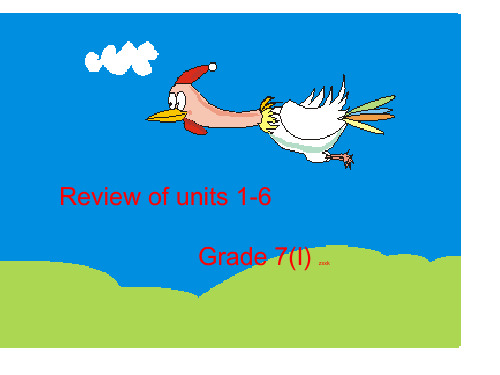
zxxk
复习目标:
1.介绍人(询问姓名) 2.介绍物( 确认物主关系、谈论物 品位置及喜好)
主格 一单 一复 二单 二复 三单 三单 I we you you he she
宾格 me us you you him her
形物 my our your your his her
名物 mine ours yours yours his hers
反代 myself ourselves yourself yourselves himself herself
三单 it
三复 they
it
them
its
their
z.x.x.k
its
theirs
itself
themselves
1.主格做主语后跟动词 2.宾格做宾语用在动词和介词后 3.形容词性物主代词是形容词后必须加 名词 4.名词性物主代词相当于名词 5.反身代词常用于固定短语中 注:主格代词的并 and you
It’s an orange.
It’s a map. a/an (不定冠词)一个+可数名词单数形式
the (定冠词) 这,这个,这些,那,那个,那些 +可数名词单、复数,不可数名词
零冠词(不用冠词:三餐、球类、专有名词、四季 /星期、月份)
the 的用法 1. 说话双方都知道的 2. 上文已提到过的 3. 世上独一无二的 the sun, the moon 4. 序数词;形容词最高级前 April the first, the tallest /most beautiful 5. 乐器前 play the violin 6. 某某一家人 the Smiths=the Smith family 7.介词短语中
七年级英语下册(1-6)复习提纲-经典教学教辅文档
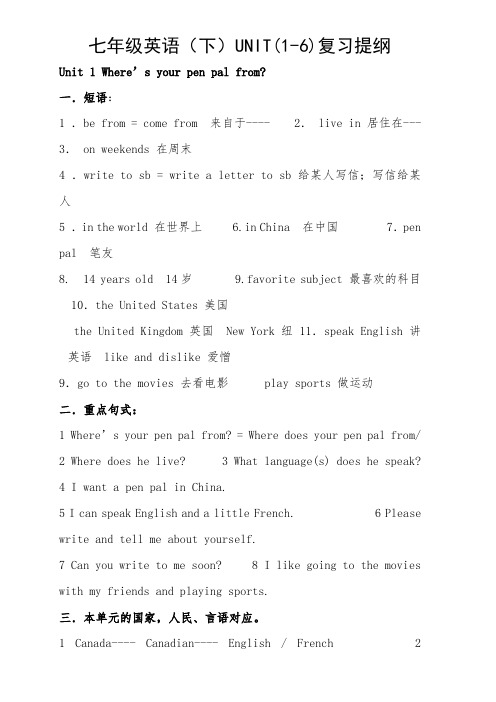
七年级英语(下)UNIT(1-6)复习提纲Unit 1 Where’s your pen pal from?一.短语:1 .be from = come from 来自于---- 2. live in 居住在--- 3. on weekends 在周末4 .write to sb = write a letter to sb 给某人写信;写信给某人5 .in the world 在世界上 6.in China 在中国 7.pen pal 笔友8. 14 years old 14岁 9.favorite subject 最喜欢的科目10.the United States 美国the United Kingdom 英国New York 纽11.speak English 讲英语like and dislike 爱憎9.go to the movies 去看电影play sports 做运动二.重点句式:1 Where’s your pen pal from? = Where does your pen pal from/2 Where does he live?3 What language(s) does he speak?4 I want a pen pal in China.5 I can speak English and a little French.6 Please write and tell me about yourself.7 Can you write to me soon? 8 I like going to the movies with my friends and playing sports.三.本单元的国家,人民、言语对应。
1 Canada---- Canadian---- English / French 2France------ French------French3 Japan------Japanese----Japanese4 Australia----Australian----- English5 the United States------ American---- English6 the United Kingdom---British----- EnghishUnit 2 Where’s the post office?一.A sking ways: (问路)1.Where is (the nearest) ……?(比来的)……在哪里?2.Can you tell me the way to ……?你能告诉我去……的路吗?3.How can I get to ……?我怎样到达……呢?4.Is there …… near here / in the neighborhood? 附近有……吗?5.Which is the way to ……?哪条是去……的路?二.Showing the ways: (指路)1. Go straight down / along this street. 沿着这条街不断走。
七年级下Units 1-6重点难点复习
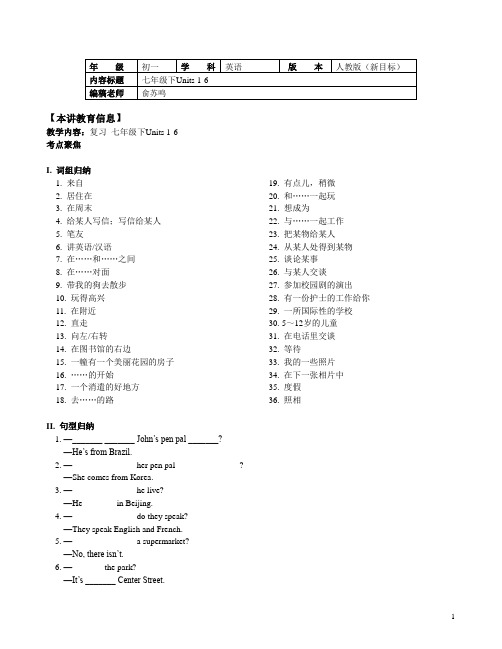
【本讲教育信息】教学内容:复习七年级下Units 1-6 考点聚焦I. 词组归纳1. 来自2. 居住在3. 在周末4. 给某人写信;写信给某人5. 笔友6. 讲英语/汉语7. 在……和……之间8. 在……对面9. 带我的狗去散步10. 玩得高兴11. 在附近12. 直走13. 向左/右转14. 在图书馆的右边15. 一幢有一个美丽花园的房子16. ……的开始17. 一个消遣的好地方18. 去……的路19. 有点儿,稍微20. 和……一起玩21. 想成为22. 与……一起工作23. 把某物给某人24. 从某人处得到某物25. 谈论某事26. 与某人交谈27. 参加校园剧的演出28. 有一份护士的工作给你29. 一所国际性的学校30. 5~12岁的儿童31. 在电话里交谈32. 等待33. 我的一些照片34. 在下一张相片中35. 度假36. 照相II. 句型归纳1. —_______ _______ John’s pen pal _______?—He’s from Brazil.2. —_______ _______ her pen pal _______ _______?—She comes from Korea.3. —_______ _______ he live?—He _______ in Beijing.4. —_______ _______ do they speak?—They speak English and French.5. —_______ _______ a supermarket?—No, there isn’t.6. —_______ the park?—It’s _______ Center Street.7. —_______ the hotel?—It’s next _______ the bank.8. —_______ _______ he like koala bears?—Because they’re _______ of cute.9. —_______ _______ he do?—He’s a reporter.10. —_______ _______ he?—He’s a doctor.11. —_______ _______ _______ _______?—I’m reading.12. —_______ Uncle Joe _______?—He’s playing basketball.13.—_______ he ______ his homework?—Yes, he is.14. — _______ the weather?—It’s windy.15. —_______ the weather _______?—It’s sunny.16. — _______ it ________?—Great!III. 考点归纳1. Where is your pen pal from? 你的笔友是哪里的人?=Where does your pen pal come from?来自使用时注意动词的变化:She’s from Korea. = She comes from Korea.She isn’t from Korea. = She doesn’t come from Korea.= Does she come from Korea?Where is he come from?Where does he from?国籍的几种表达方法:Tom是个美国人。
外研版七年级英语下册(Module1-6)期末复习知识点整理汇集

外研版七年级英语下册(Module1-6)期末复习知识点整理汇集MODULE1Lost and Found1.lost and found box失物招领箱2.welcome back欢迎回来3.first of all首先4.here is/are...这有...5.from now on从现在开始6.be careful with小心保管7.whose bag谁的包8.talk to sb.与某人交谈9.mobile phone移动电话,手机10.get on上车(get off下车)11.two thousand两千(thousands of数以千计的...)12.look for寻找13.at the moment现在14.in a hurry匆忙地15.a lot of许多,大量a lot of things许多东西.a lot of animals许多动物16.on the train在火车上17.every day每天18.such as例如for example19.make a list of列一张...的清单20.ask/answer questions问/回答问题welcome不用客气21.a purple wallet一个紫色的钱包22.you’re23let me see让我看看let sb.do sth.让某人做某事24some nice gloves一些好的手套25.lose things丢失东西26.at airports在机场27.many other things许多其他的东西28.two thousand mobile phones两千部手机29.some strange things一些奇怪的东西30.fifteen kilos of sausages十五公斤香肠31.a large boat一艘大船32a hundred一百two hundred两百hundreds of数以百计的重点句子:1.Welcome back to school!欢迎回到学校。
人教七年级下册英语期中复习unit1-unit6知识点总结
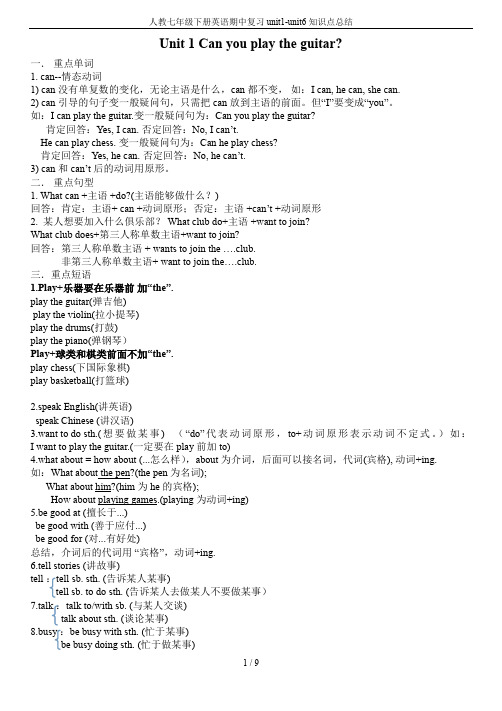
Unit 1 Can you play the guitar?一.重点单词1. can--情态动词1) can 没有单复数的变化,无论主语是什么,can都不变,如:I can, he can, she can.2) can 引导的句子变一般疑问句,只需把can放到主语的前面。
但“I”要变成“you”。
如:I can play the guitar.变一般疑问句为:Can you play the guitar?肯定回答:Yes, I can. 否定回答:No, I can’t.He can play chess. 变一般疑问句为:Can he play chess?肯定回答:Yes, he can. 否定回答:No, he can’t.3) can 和can’t后的动词用原形。
二.重点句型1. What can +主语 +do?(主语能够做什么?)回答:肯定:主语+ can +动词原形;否定:主语+can’t +动词原形2. 某人想要加入什么俱乐部? What club do+主语 +want to join?What club does+第三人称单数主语+want to join?回答:第三人称单数主语 + wants to join the ….club.非第三人称单数主语+ want to join the….club.三.重点短语1.Play+乐器要在乐器前加“the”.play the guitar(弹吉他)play the violin(拉小提琴)play the drums(打鼓)play the piano(弹钢琴)Play+球类和棋类前面不加“the”.play chess(下国际象棋)play basketball(打篮球)2.speak English(讲英语)speak Chinese (讲汉语)3.want to do sth.(想要做某事) (“do”代表动词原形,to+动词原形表示动词不定式。
外研版七年级英语下册M1-6重点总结
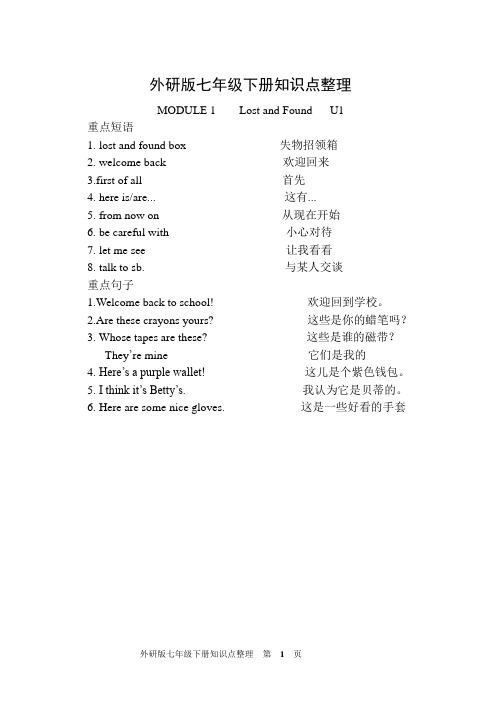
外研版七年级下册知识点整理MODULE 1 Lost and Found U1重点短语1. lost and found box 失物招领箱2. welcome back 欢迎回来3.first of all 首先4. here is/are... 这有...5. from now on 从现在开始6. be careful with 小心对待7. let me see 让我看看8. talk to sb. 与某人交谈重点句子1.Welcome back to school! 欢迎回到学校。
2.Are these crayons yours? 这些是你的蜡笔吗?3. Whose tapes are these? 这些是谁的磁带?They’re mine 它们是我的4. Here’s a purple wallet!这儿是个紫色钱包。
5. I think it’s Betty’s.我认为它是贝蒂的。
6. Here are some nice gloves. 这是一些好看的手套MODULE 1 Lost and Found U2重点短语9. mobile phone 移动电话,手机10. get on the bus 上车11. two thousand 两千12. look for 寻找13. at the moment 现在14. in a hurry 匆忙地15.many other things 许多其他的东西16. hundreds of 数以百计的17. strange things 奇怪的东西18. fifteen kilos of sausages 15公斤的香肠19. such as 例如重点句子7. They leave things on planes, on trains, on buses and in taxis.8. That's why there are lots and found office is at airports and stations9. Hundreds of people come here every day.10.They are looking for their phones cameras, watches, computers and many other things11.There are about a hundred bikes and a large boat12. Are you looking for fifteen kilos of sausages?7.他们把东西落在飞机上,火车上,公交车上或者出租车上。
- 1、下载文档前请自行甄别文档内容的完整性,平台不提供额外的编辑、内容补充、找答案等附加服务。
- 2、"仅部分预览"的文档,不可在线预览部分如存在完整性等问题,可反馈申请退款(可完整预览的文档不适用该条件!)。
- 3、如文档侵犯您的权益,请联系客服反馈,我们会尽快为您处理(人工客服工作时间:9:00-18:30)。
七下1-6重点词汇用法1.play: play with / play the guitar /play chess / play sports / playbasketball2.swim: like swimming / be good at swimming / join the swimmingclub / swimming pool3.speak: speak English / speak Chinese4.talk : talk to = talk with / talk about(谈论)/ talk on the phone5.tell: tell stories / tell jokes(讲笑话)/ tell sb. to do sth.6.Join: join the dancing club /Come and join us. / join me fordinner=have dinner with me7.Write : write stories / be good at writing / write down(记下,写下)8.Show: TV show / talk show / the elephant show / come and showus / show me your photos = show your photos to me (给…看)9.help : help me with my math (help sb. with sth.) / help sb. to do sth./ help to do sth. / Thanks for your help.10.m ake: make friends (with sb.) / make soup / make zongzi / (be)made of / make (one’s)bed /make rules to help us11.b e : be good at drawing/ be good with children/ be good for yourhealth(健康,名词)/ be strict with (sb.) 对某人严格要求; be strict in sth.(在某方面严格)/ (be) on time / be in danger/ be afraid / be noisy / be late for / be quiet/be from=come from / be friendly to sb.=be kind to sb. (对….友好)/ be lost = get lost12.g et : get up / get dressed / get lost=be lost / get to13.t ake: take a shower / take a walk / take the subway / take amessage(捎个口信)/ It takes him two hours to finish his homework.(It takes sb. sometime to do something.)14.d ress the baby / dress himself (给…穿衣服)/ get dressed / wearthe school uniform / wear a hat / be wearing(正穿着,强调状态)/ put on(穿上,强调动作)15.d o : do (one’s)homework / do th e dishes= wash the dishes / doKung fu16.r un: like running / be good at running / a running star / runner17.c lean : clean the room / keep your room clean / be cleaning18.w alk : walk to school / take a walk19.t aste : taste good / taste like(品尝起来像)sound : sounds good / sound like(听起来像)20.r ide : ride a bike / ride a horse / the bus ride / learn to ride a bike21.b y : by bike / by car / by subway / by bus / by train / by air22.d rive : drive a car / drive to …/ driver23.t hink : think of (想起,认为)What do you think of the trip ?/think about (考虑)24.l ike : like doing = like to do / be like / look like / be like a father to me25.l eave : leave home / leave the village / be leaving26.c ome : come true / come from = be from / come on27.a rrive : arrive in Beijing; arrive at the village=get to the village /arrive late for=be late for28.c ross: cross the river =go across the river / crosses29.b ring : bring…to… / bring…..here (把…带来)take : take…..to…..(把…拿走)30.l isten : listen to music / listen to a CD / like listening to pop music31.p ractice : practice the piano = practice playing the piano / practicespeaking English32.f ight : Don’t fight. / fight with other people33.g o : go out / go shopping / go to the movies / go to school / go towork34.r elax: relaxes / relaxing (形容词)/ relax (动词)for half an hour35.r emember : remember to do sth. / remember doing sth. (foget有同样的用法)36.k eep : keep healthy(健康的,形容词)/ keep one’s hair short (留短发)/ keep quiet / keep your room clean(keep+n.+adj.)37.f ollow the rules / break(违反)the rules / traffic rules / strict rules /family rules / school rules / make rules38.s ave : save animals / save one’s life; save one’s lives(救…的命)/save(节约)water39.r ead : read books / read a newspaperwatch : watch TV / watch a race / watch soccer games40.c ut : cutting / cut down many trees41.u se : be using the computer/ a useful book (一本有用的书)/ a usedbike(一辆旧自行车)42.eat : eat out / eat breakfast / eat dinner = have dinner / No eating.43.m iss : He misses(想念)his family a lot. / miss(错过)the early bus/ Yo u can’t miss it.(你不会错过的)44.w ish : wish to do sth. / wish sb. to do sth. / best wishes(最好的祝福)45.S tudy: studies / be studying / study math /study (研究)Chinesehistory / in the study(书房)46.One 11-year-old boy / an 80-year- old man47.Kill : kill….. for….为….而杀害48.It : It is easy to get to school for many students.It is their dream to have a bridge.It takes him an hour to finish his homework.49.or: Do you walk or ride a bike ?I can’t sing or dance.either…. or…. He either watches TV or play computer games.either: I can’t relax, either.50.call: call sb. at……/ call sb. back(给…回电话)/ call sb.= talk on thephone to sb.(给….打电话)1-6单元特殊疑问句1.What can you do ? What club do you want to join ?2.What time do you usually get up? When does he go to work ?3.How does she get to school?How far is it from your home to school ?How long does it take you to get to school?4.What are the rules ? What do you have to do ?5.Why don’t you like tigers ? =Why not like tigers ?Where are you from?=Where do you come from ?6.What are you doing ? What is he doing?7.What’s the weather like ?= How’s the weather?How’s it going ? (近况如何)变否定句1.Alan can play the drums. Alan can not play the drums.2.David brushes his teeth every day.David doesn’t brush his teeth every day.3.He has to wear the school uniform.He doesn’t have wear the school uniform.4.My father is reading a newspaper.My father isn’t reading a newspaper.5.Two boys are late for class today.Two boys are not late for class today.提示:二卷选词填空B篇,注意填对词并正确形式,特别是be doing。
